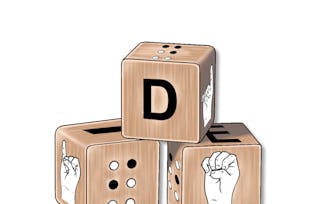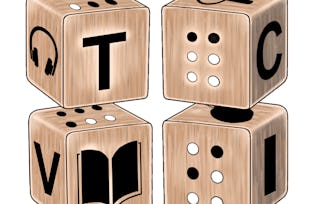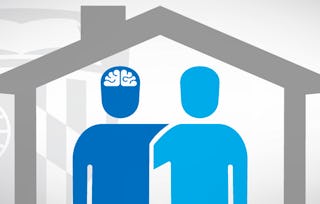This course is about caring for and educating children (and youth) with severe to profound intellectual disability. We use the idea of 'circles' to position the child at the center of the many levels of support needed. Around the child are circles of care and education - such as the parents, family, friends, caregivers, educators, health care workers, and others such as neighbors, business owners, and community members. Each one has an important role to play in the life of a person with an intellectual disability and can be seen as a caregiver and educator. Although this course is aimed particularly at caregivers who work at a special centre or in a private home, each person in the circle of care and education plays a valuable role and will find the course useful.

Ends soon: Gain next-level skills with Coursera Plus for $199 (regularly $399). Save now.

Severe to Profound Intellectual Disability: Circles of Care and Education

Instructor: Judith McKenzie
13,551 already enrolled
Included with
(192 reviews)
What you'll learn
Empowering all the people who work in a team to care and educate children with severe to profound intellectual disability
Considering lifelong learning by exploring brain development, the learning process, and how to maximise the opportunities for learning.
How you can support children with severe to profound intellectual disability so that they can reach their full potential.
Skills you'll gain
Details to know

Add to your LinkedIn profile
See how employees at top companies are mastering in-demand skills

There are 4 modules in this course
This week focuses on understanding the child (or person) with severe to profound intellectual disability. We will look at the definitions and terms related to intellectual disability and provide an overview of the history of intellectual disability. We will also explore how the needs and rights of children with severe to profound intellectual disability can be supported, with a particular emphasis on their right to education. We invite you to comment in the discussion forum, check your knowledge in the practice quizzes and take the graded quiz at the end of the week.
What's included
9 videos6 readings3 assignments2 discussion prompts
Lifelong learning is an approach that views everyday living as providing children with severe to profound intellectual disability opportunities to learn. With input from several experts, we'll explore how children with severe to profound intellectual disability can learn with appropriate support, what can be done to best facilitate the learning process and the importance of the learning environment. Attitudes and communication are highlighted as being central to creating effective environments for learning. Researchers also report on their findings from a local study on intellectual disability and life long learning in South Africa. At the end of this week, there are additional readings, a forum for discussion and a graded quiz.
What's included
10 videos2 readings3 assignments1 discussion prompt
This week we look at the learning support needs of children with severe to profound intellectual disability. We consider how to set up learning programmes and integrate different skills and activities. We look at how to change or adapt these programmes to meet the specific needs of mixed groups of children and those in different stages of learning. We also explore the role of structure and routine in creating effective learning environments. Lastly, we look at empowering the caring team, to support the development of children with severe to profound intellectual disability. At the end of this week, you will be asked to critically evaluate a learning programme and review the assignment of peers.
What's included
11 videos4 readings1 peer review1 discussion prompt
This final week focuses on the relationships of care. We explore ways of giving agency to children with severe to profound intellectual disability who have been central to advocacy campaigns for their full inclusion in society. We also hear from caregivers who are, in many cases the key advocates for persons with intellectual disability. The circle of care for the caregiver is discussed, highlighting how they too need to be cared for and empowered. At the end of this week, there is a graded quiz. You may also choose to do the optional Honors Peer Review assignment.
What's included
8 videos4 readings3 assignments1 peer review1 discussion prompt
Instructor

Offered by
Explore more from Healthcare Management
 Status: Preview
Status: PreviewUniversity of Cape Town
 Status: Free Trial
Status: Free TrialCinematic Health
 Status: Preview
Status: PreviewUniversity of Cape Town
 Status: Preview
Status: PreviewJohns Hopkins University
Why people choose Coursera for their career




Learner reviews
192 reviews
- 5 stars
83.58%
- 4 stars
13.84%
- 3 stars
1.53%
- 2 stars
0%
- 1 star
1.02%
Showing 3 of 192
Reviewed on Apr 15, 2021
It gets you motivated to be the voice of those who can't speak for themselves. You learn a lot about the environment and the system of children with severe to profound intellectual disability
Reviewed on May 19, 2020
The course was Excellent and the way it describe was so easy to understand
Reviewed on Mar 9, 2021
Very successful course content with new and practical knowledge for both caregivers and therapists
Frequently asked questions
To access the course materials, assignments and to earn a Certificate, you will need to purchase the Certificate experience when you enroll in a course. You can try a Free Trial instead, or apply for Financial Aid. The course may offer 'Full Course, No Certificate' instead. This option lets you see all course materials, submit required assessments, and get a final grade. This also means that you will not be able to purchase a Certificate experience.
When you purchase a Certificate you get access to all course materials, including graded assignments. Upon completing the course, your electronic Certificate will be added to your Accomplishments page - from there, you can print your Certificate or add it to your LinkedIn profile.
Yes. In select learning programs, you can apply for financial aid or a scholarship if you can’t afford the enrollment fee. If fin aid or scholarship is available for your learning program selection, you’ll find a link to apply on the description page.
More questions
Financial aid available,
¹ Some assignments in this course are AI-graded. For these assignments, your data will be used in accordance with Coursera's Privacy Notice.





